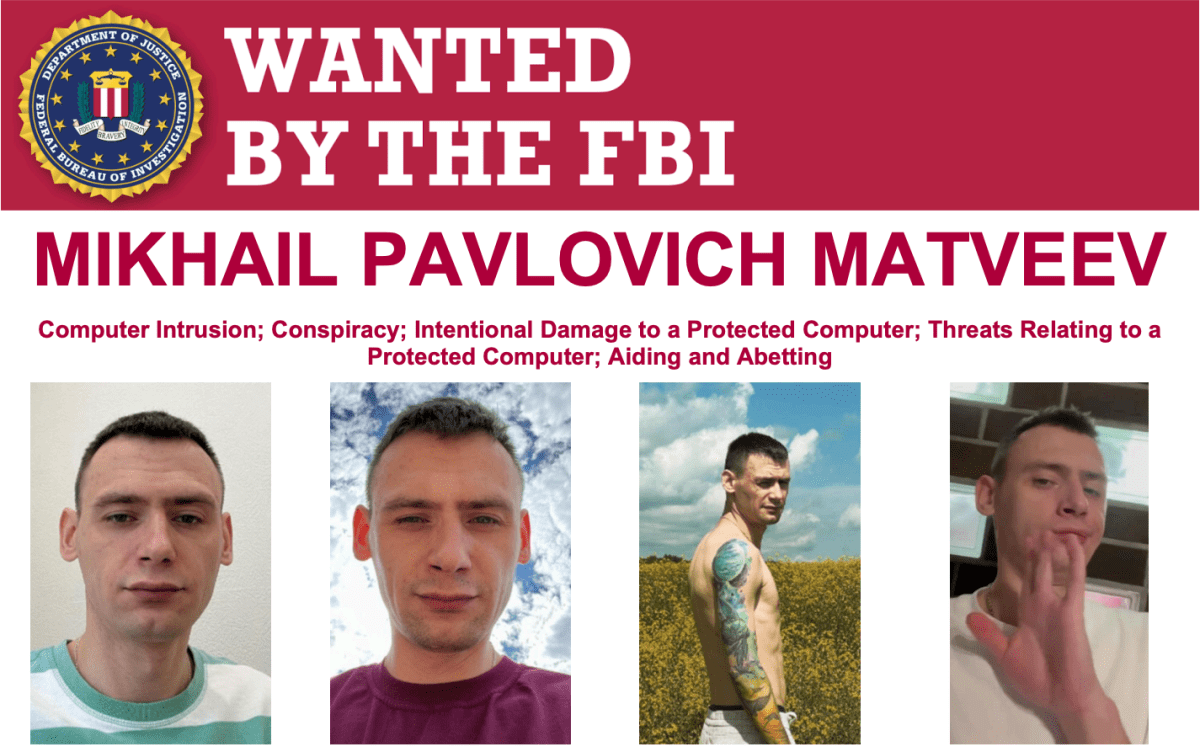
Russian hacker Mikhail Matveev, also known on the internet as “Wazawaka” and “Boriselcin,” is wanted by the FBI, which is offering a $10 million reward for information that could lead to his arrest, and has been put on a U.S. sanctions list. But, according to Matveev, his life hasn’t changed much since he was outed as an alleged cybercriminal and put on the FBI’s most wanted list.
“We are Russian people, we are not afraid of the American government,” Matveev told TechCrunch in an online interview. “My life has changed for the better after the sanctions, I don’t feel them on me, as well as sanctions are a plus for my security, so sanctions help us.”
In an interview where he answered both in English and in Russian, Matveev said that being sanctioned means Russia will not deport him. And to avoid getting caught outside of Russia, he won’t travel anymore, and said he has “burned” his passport. His last trip, he said, was to Thailand in 2014, where he ate scorpion, which he said was “delicious.”
Earlier this year, the U.S. government accused Matveev of participating in “a global ransomware campaign” against victims all over the world. Prosecutors claim Matveev is “a prolific ransomware affiliate,” who worked with the Hive, LockBit and Babuk ransomware gangs to carry out “significant attacks” against corporations and critical infrastructure in the U.S. and elsewhere, including hospitals and government agencies. In particular, the feds said Matveev “allegedly intentionally infected” the computers of Washington, D.C.’s Metropolitan Police Department with ransomware.
Matveev, however, said he actually isn’t affiliated with any ransomware group and that he only “rented their software for my own purposes.” Since the indictment and sanctions, he said, he has joked about the measures taken against him with people still involved in ransomware operations.
“We sometimes throw memes at each other,” he said.
He said he was using the ransomware to both test it in a controlled environment and to deploy it in real-life scenarios.
“I have never been the author of the Hive and Lockbit project, I was only an affiliated independent person — by myself, my own master,” Matveev said, adding that he is not interested in ransomware anymore.
Since he was indicted and sanctioned, Matveev has kept a prolific life on X, formerly Twitter, given interviews to cybersecurity publications and trolled the U.S. government by printing a T-shirt featuring his own FBI most wanted poster and asking his followers if they’d like to buy similar merch.
An unnamed FBI spokesperson said the bureau declined to comment.
We verified that Matveev was really the person behind the X account by asking him for selfies. Matveev provided a selfie showing his left hand, which has only four fingers, per Matveev’s FBI’s most wanted page, as well as a selfie holding a piece of paper that had this reporter’s name handwritten on it. Matveev said he lost his finger in 2017 when he was installing a server cabinet that weighed 35 kg (around 77 lbs), which forced him to get surgery.
The alleged hacker declined to say how much money he has made with his ransomware work, and said he now invests in crypto, and recommended everyone do the same. Matveev said he is also working on a website about cybersecurity. Although he declined to say how much money he’s made with his ransomware activities, he denied that the income the FBI is attributing to him and his accomplices — $200 million in ransomware payments — is real.
Matveev added that he is not interested in ransomware anymore. But asked if he misses hacking, he said “very much :(” and he also said he may go back to hacking “but no one will know about it.”
Do you have more information about any ransomware gang? We’d love to hear from you. You can contact Lorenzo Franceschi-Bicchierai securely on Signal at +1 917 257 1382, or via Telegram, Keybase and Wire @lorenzofb, or email lorenzo@techcrunch.com. You can also contact TechCrunch via SecureDrop.





